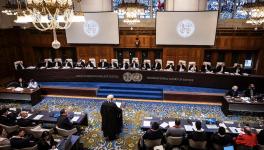Antrix Devas: A Bad Deal Turns Even Worse
The recent judgement of the Hague tribunal follows the one in Paris earlier. In both cases, the international tribunals have ruled against India. The reason that sovereign states are being taken to international arbitration is due to various bilateral investment treaties they have signed. These treaties are heavily weighed against the global south countries, creating a neocolonial regime in the world today. A new industry has sprung up whose main occupation is suing global south governments on behalf of global capital. This robs the global south the economic headroom they sorely need for taking policy decisions.
In this particular case, India struck a bad deal with respect to the S Band spectrum. The spectrum was grossly undervalued, and the Department of Space gave away spectrum which was not theirs to give. To compound the problem, the cancellation was done equally badly, weakening India's position. India will have to work hard to avoid the consequence of a bad deal which has turned even more sour.
Rough Transcript
Siddharth Adelkar (Siddharth): Hello and welcome to Newsclick. This programme with The Real News. An International Trade Tribunal at The Hague has imposed a penalty on India. This penalty comes out of a law suit between Devas, a company from Mauritius and Antrix, the commercial arm of Indian Space Research Organization (ISRO), an organization owned by the government of India. To talk about this strange event that encompasses space research through international treaties, to trade tribunals, we have with us Prabir Purkayastha.
Prabir, what are the details of this deal? What were the terms of the contract?
Prabir Purkayastha (Prabir): The deal was between Antrix and Devas, which was for essentially 70 MHz of spectrum in the S band which ISRO occupied or was given this spectrum by the government of India and this deal was reached between Antrix, really the commercial arm of ISRO and Devas supposedly for broadband multimedia usage. So this was done in 2005. We did not really know much about it. In fact there is hardly any publicity on that and subsequently in 2011, it became clear that this involved a huge transfer, essentially of the S band spectrum to Devas, is the consequence of this deal. And by that time, we were much clearer about what the spectrum is and what it means in commercial terms. So the question was did ISRO or Antrix have the right to transfer something which was given to it for space purposes into such commercial usage. Did this right belong to ISRO at all and was it done without really following the various procedures that should have been followed in such a case?
Siddharth: And why did it did not go through?
Prabir: It was grossly undervalued spectrum that was sold because all that Antrix was going to get was 300 million dollars essentially spread over twelve years. If we take what it was going to spend, it was going to spend almost a similar amount (because you have to consider future earnings as really discounted earnings). So if you take the amount that ISRO was supposed to spend on the launches of which ninety percent of the transponders would be occupied by Devas alone, so this was really a commercial deal, that didn't really make much sense. In fact, that was a lot of outcry over it. Comptroller and Auditor General (CAG) had a very strong report against this deal and at that point of time two committees went into it and found various procedural lapses.
Siddharth: Why international trade treaties? Where do bilateral international treaties come into picture in space research?
Prabir: In this particular case, this is a consequence of the bilateral treaty agreement that India has. We have now bilateral agreement treaties with eighty odd countries (eighty three countries probably) and these bilateral treaties have very stringent provisions for protection of investors, which means that the investors can take India to court on policies. And those policies could be, even say banks being forced to open rural branches or to give credits to certain core sector lending as banks in India do. All of this, if you privatize these banks or you disinvest some of the shares of the banks, the share holders under bilateral treaties can then sue you abroad. This is what has happened to Coal India. This is what has also happened to India on, for instance, all these telecom cases…because the telecom license is being canceled … and also Vodafone suing India for retrospective imposition of certain taxes.
Siddharth: Antrix is a commercial company and so is Devas. Why would Devas sue India at an international court? How do international bilateral treaties come into picture between two commercial companies?
Prabir: Why did India gets into bilateral treaties itself is another question. That is basically trying to reach what are called Free Trade Agreements (FTA), looking for investments from abroad. So under liberalization, the argument was, we need foreign capital. For foreign capital, we need to give some incentives to foreign capital. Therefore, we need to make certain conditions with such foreign capital – which is a bilateral investment treaty. That's really the form that it finally takes – the investment treaties that allow some settlement conditions for the investors.
Now, most of these bilateral investment treaties then have clauses which appear rather innocuous. When you read these clauses, you don't understand the implications. Implications of these are that under these bilateral investment treaties, India can be sued in a foreign jurisdiction and essentially then … whether India has expropriated the interests of other companies? [This judgement] will not be left to the courts in India but would be left to what are essentially commercial arbitration procedures which are heavily weighted against global south countries. Now, this has been the experience of all global south companies who have really signed these treaties, I would say, in blissful ignorance without understanding what it entails. They didn't even know what it entailed till they were sued essentially. Argentina for instance in 1998, 2002 got into a very serious crisis. They have now 56 suits against them again in various tribunals, again all arguing for expropriations of interests of foreign capital and essentially, these are internal policy measures that Argentina was forced to take.
So Devas investors … there was an investment company called Devas in Mauritius which has invested in Devas, India which is a so-called Indian company. They are the ones as investors, protecting their investments in India [who] – under the bilateral investment treaty with Mauritius – have taken the Indian government to court saying, “By virtue of your decision, you have essentially expropriated our investments in India”. But this is also because of the nature of the cancellation. The cancellation essentially was by the Indian government, saying that the S band spectrum is not meant for commercial use. So therefore, they did not allow ISRO and Antrix to sell this spectrum, though it was already committed through the Antrix-Devas agreement. So that led to Antrix saying, “It's a force majeure case, beyond our control and therefore we can not do anything about it. We have to cancel the contract”. [There could] have been a relatively easier course if for instance instead of using this, shall we say hammer as a weapon, we had a commercial dispute with Devas. Because Devas had not fulfilled many of its contractual deliveries. It was supposed to deliver a certain set of things. It had not done so. So it could have been cancelled if we would have looked at all of these [violations] and if we would have understood that if we go the route that we finally did, that would open us to various commercial litigations which is what happened.
Siddharth: But that brings up an important question that you write about in your article which is that there is an industry of lawyers that has cropped up that basically are in the business of suing governments.
Prabir: Yes. This is a new industry as the West's, shall we say, industrial prowess decreases. Its legal and financial prowess seem to be increasing. One of the consequences of this is this whole new industry that has sprung up which is international lawyers suing sovereign governments in various courts. Most of them are investors in the US or other investors located in Europe. Their investments routed a lot of them to Netherlands, which seems to be the most, shall we say, favourable to the investors and also, Holland's bilateral treaties seems to be also most favourable to the investors.
So lot of them are being sued in this form. So it is a new industry of lawyers who have come up. The other part which is also very disturbing is the number of arbitrators who are dealing with all these cases are very very few. They all seem to be also part of companies who also do the suing. So there is a revolving door here. A partner of a company is an arbitrator and the company may be involved on the investors' side in other case.
Siddharth: There is another revolving door involved here. What is Devas? I mean where does Devas come from?
Prabir: Devas is a company whose investors are really not very transparent because once you come through the Mauritius route, we do not know who the original investors are, because you have a sort of shadow board which has some figure heads which supposedly are Devas but they really are not the original investors. So whether it is black money, whether it is other money … we really don't know who Devas is.
Siddharth: In terms of next step Prabir, what can a country in the global south like India … what should India's policies, outlook be towards bilateral treaties in the context of this climate of suing and very disadvantageous treaties?
Prabir: I think the government of India has realized this know. We have been saying this for last 15 years, “Please look at the bilateral investment treaties. All these trade talks of liberalizing trade globally investment being treated as trade, WTO getting into protection of capital flows. All this, we have been saying, please understand what it does is takes away your ability to control your own economy”. So they are essentially continuation of neocolonial policies. Now, two things that the government of India has to do. One is of course, ask for revision of all the treaties or walk out of them. Now, that's an easy way. But unfortunately, some of the treaties have a sunset clause. Even if you walked out of them, for the things you have done, you could be liable for next fifteen years. So there is unfortunately a longevity of the treaties even if you walk out of them. But we need to renegotiate because India has economic clout. It needs to renegotiate and modify these treaties or cancel them as it can. So whichever ones can be canceled, it should cancel or modify under this threat. On the other side of it, I think India has a much bigger role to play which is internationally look at the regime of such treaties and what is being done in terms of commercial disputes with countries. I think a huge number of countries are at risk because whats happening is increasingly the global system of judgments either the courts in the US … US courts have actually allowed the compensation against Argentina. It has allowed compensation against Iran on cases which has nothing to do with the basic trade dispute. So you have to look at these kinds of issues that a global regime, international law regime which is fair to the global south has to be built and I think India should take this up. It relates to taxation, it relates to tax havens, it relates to whole number of issues in which we see a continuation of neocolonial policies under now legal garb and let's not forget, a lot of countries lost their independence according to treaties which were one sided and then was used later on to take away their independence.
Siddharth: In terms of this specific case, what can be the next steps?
Prabir: Well, I think we have really got ourselves into a really huge jam. Partly because the steps we take now will appear retrospective, as a means to address 'a mistake that had been done earlier'. So it may not look very good, if at this moment we try to do various things. One of the things which India has fortunately done is that, it did take up violations of law that Devas had [perpetrated].
So the enforcement directorate had cases that it had looked for, given them notices for violations of FEMA (Foreign Exchange Management Act). So there are legal violations that one can look at for which Devas can be pulled-up, including the fact that it had made certain promises when it applied in front of the foreign investment promotion board. So some of those clauses of the provisions under which they had got the clearances, it appears, have been violated. So we can take them up there. We can also take up these cases … because finally the implementation of this has to be done in India, we can take up this in the Indian courts, which already we have. So those are some of the legal steps we can take. But the danger here is that the UNCITRAL (United Nations Commission on International Trade Law) procedures which India is a party to – it has signed the treaties – are rather onerous, and it can mean that the Indian government's properties abroad can be attached if such courts then … if these companies apply to move against the Indian government.
Siddharth: That is all the time for today. Keep watching Newsclick for more.
DISCLAIMER: Please note that transcripts for Newsclick are typed from a recording of the program. Newsclick cannot guarantee their complete accuracy.
Get the latest reports & analysis with people's perspective on Protests, movements & deep analytical videos, discussions of the current affairs in your Telegram app. Subscribe to NewsClick's Telegram channel & get Real-Time updates on stories, as they get published on our website.























